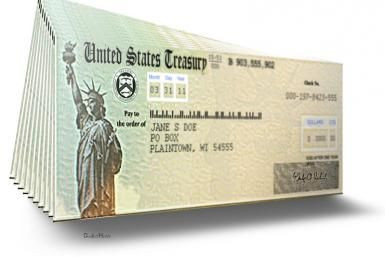Next Coronavirus Check: How Much Money Can People Expect In Round 2?

KEY POINTS
- The legislation is the fifth spending bill presented since the coronavirus pandemic has started to grip the nation
- The measure would provide nearly $1 trillion to beleagured state and local governments
- Enhanced unemployment benefits would be extended to March 2021
House Democrats on Tuesday unveiled a $3 trillion coronavirus relief measure, doubling what Congress has authorized so far to mitigate the economic damage from the pandemic and fight the virus itself, as Republicans were worrying aloud about the budgetary impact of the legislation passed since mid-March.
The Health and Economic Recovery Omnibus Emergency Solutions Act – dubbed the HEROES Act -- includes nearly $1 trillion for state and local governments, which are reeling from the impact of the virus as healthcare and unemployment costs soar and tax revenue plummets amid stay-at-home orders that have kept businesses shuttered.
The bill also would provide more direct payments to Americans -- $1,200 for adults and dependent children -- and extend enhanced unemployment benefits through March 2021.
The bill is slated for a vote on Friday but stands little chance of getting to the Senate floor in its current form. Treasury Secretary Steven Mnuchin and Senate Majority Leader Mitch McConnell have indicated they are in no hurry to pass what would be the fifth piece of legislation dealing with the crisis, preferring to assess the impact of earlier legislation first.
"We now have a debt the size of our economy. So I have said and the President has said as well that we need to take a pause here," McConnel said.
Negotiations on a new bill have yet to start, pushing any timeline for the next round of relief into at least June.
“I can’t remember a point in our history where we shut down the economy of our country,” House Majority Leader Steny Hoyer said. “As a result we need to respond in unprecedented ways with unprecedented resources.”
The Democrats’ wishlist includes $75 billion for housing assistance, $1.5 billion for broadband and $10 billion for small businesses, as well as more than $10 billion for food assistance and agriculture. It also would provide $25 billion for the U.S. Postal Service.
Public health and social services would be able to dip into a $175 billion emergency fund.
The proposed bill contains no mention of liability relief for businesses, something McConnell has said would need to be in any future bill.
© Copyright IBTimes 2025. All rights reserved.





















